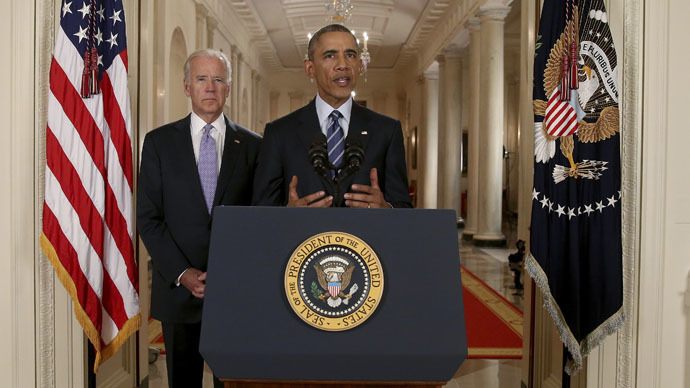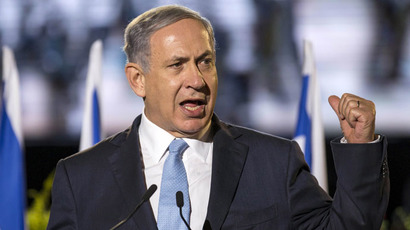Verification, not trust behind nuclear deal – Obama

The deal with Iran is based on verification mechanism and not trust, US President Barack Obama said speaking from the White House after the Vienna talks’ success, in an apparent deflection of criticisms his administration faces over the agreement.
Follow RT's LIVE UPDATES on Iran nuclear deal
He insisted the action plan agreed in Vienna on Tuesday leaves no way for Tehran to make a nuclear weapon and stops nuclear proliferation in the Middle East.
“I believe it would be irresponsible to walk away from this deal,” Obama said. “I am confident that this deal will meet the national security interests of the United States and our allies.”
Here's the difference between an #IranDeal and no deal → http://t.co/3PJ1t0Zk7Upic.twitter.com/r1zsJUdgBG
— The White House (@WhiteHouse) July 14, 2015
He warned the Republican-dominated Congress that failure to stick to America's part of the deal would leave no long-term restraint on Iran's nuclear program. He said he would veto any act seeking to undermine the nuclear agreement.
Congress action is required within 60 days after the deal is endorsed by the UN Security Council in order to lift nuclear-related sanctions from Tehran. There are skeptics among the American legislators, who believe that negotiating the deal was a mistake in the first place.
Obama also stressed that the sanctions that American has to lift under the deal do not include those relating to alleged abuse of human rights in Iran and alleged support of terrorism. Critics of the talks argued that Tehran would be encouraged to continue such wrongdoings, if the nuclear deal is struck.
Republicans won’t back any deal ‘jeopardizing’ US security
Back in the US, Republican politicians voiced criticisms of the agreement, saying that it may undermine the US national and start a new nuclear arms race.
"Instead of stopping the spread of nuclear weapons in the Middle East, this deal is likely to fuel a nuclear arms race around the world," John Boehner, House Speaker, is cited by The Hill website.
According to Boehner, the lifting of sanctions will provide Tehran will billions of dollars, which will be used to develop nukes. He urged the Senate to thoroughly review the agreement with Iran, stressing that he won’t support any deal “that jeopardizes the safety of the American people.”
The Senate Foreign Relations Committee, Bob Corker, said that even with a deal in place, Tehran will “cheat by inches” because its desire to own a nuclear bomb is too great.
“We know they were building a bomb, we just don’t know how far along they were… We have to make sure this is verifiable,” Corker told NBC’s Meet the Press program.
Republican presidential candidate Marco Rubio said he would vote against the deal, saying it undermines US national security.
The accord, which allows Iran “to retain the ability to develop nuclear weapons, threaten Israel, and continue their regional expansionism and support for terrorism” was negotiated by the Obama administration from the “position of weakness,” Rubio said.
The Republican’s negativity towards the Iranian accord has more to do with the US domestic affairs than international policies, Dr. Hooshang Amirahmadi, president of the American Iranian Council told RT.
“The Republicans want to make this deal – President Obama’s deal as opposed to a bipartisan or American deal. And then use that Obama deal, just like Obamacare, against the Democrats during the election [in 2016],” Amirahmadi explained.
READ MORE: 'Stunning historical mistake': Netanyahu says Israel is not bound by Iran nuclear deal
Publisher of the Trends Journal, Gerald Celente, said that as an American he was “astounded” by the Republican opposition towards the Iranian deal.
If the deal collapses in the US “under the pressure from Israel; and the Republican Congress; and Democrats that side with Israel, it’s going to really cast a shadow over America as a very weak country that doesn’t have the strength to stand on its own,” Celente said.
But even if that happens, “let’s not forget, there’s five other nations involved in this (UK, France, Germany, China and Russia). So, the US isn’t calling all the cards,” he added.
Owen Alterman from the Institute for National Security Studies in Tel Aviv expressed doubt that all Israel’s influence on the Congress will be enough to bring down the Iranian nuclear deal.
“In order for the Congress to be able to block the implementation of the agreement there’ll need to be a two-thirds majority in the two Houses to override president Obama’s veto. That’s a very high bar. And there’s no guarantee that Israel will be able to see it reached even if it puts all its efforts in,” he said.
Alterman believes that in order to have at least some chances, Israeli politicans have to give up tough rhetoric and come up with a message that would be better received in the US, especially, among democrats.
“Israel needs to come in and say ‘Israel supports peace and not war. Israel supports the principal of peaceful resolutions of disputes. It’s just that this agreement that over the long term will not lead to peace,” he told RT.













